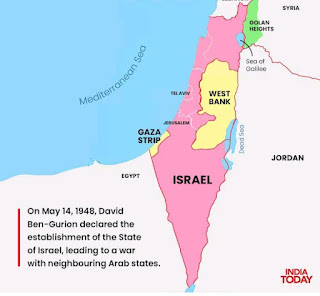Navigating the Israeli-Palestinian Conflict: A Pragmatic Perspective
The recent outbreak of violence between Israel and Hamas in Gaza has sent shockwaves through the international community. In this essay, we will examine the multifaceted dynamics that have led to this crisis, its immediate implications, and the broader geopolitical context. To facilitate a clearer understanding, we will present the discussion as an essay, organized into key sections.
Historical Context and Gaza
To grasp the roots of the ongoing conflict, we must first delve into the historical context. The Palestinian territories, including Gaza, have long been a source of tension and strife. Gaza, home to over two million Palestinians, is under the control of Hamas, a group that does not recognize Israel's right to exist. This situation has hindered the pursuit of a two-state solution, the notion that stability can only be achieved when Palestinians have sovereignty, statehood, and control over their economic trajectory.
However, recent geopolitical developments have reshaped the landscape. A wave of countries in the Middle East has moved towards establishing diplomatic relations with Israel, irrespective of the Palestinian issue. The Abraham Accords, signed during the Trump administration, saw the UAE, Bahrain, and Morocco formalizing ties with Israel. This shift in regional dynamics has diminished the urgency of the two-state solution, and it seems the world's collective interest in the Palestinian question has waned.
Internal Israeli Priorities:
The Israeli response to the crisis is influenced by domestic factors. Israel is currently dealing with its own constitutional crisis, with Prime Minister Netanyahu facing corruption charges and pushing for judicial reform. Large-scale demonstrations have erupted across the country, focused on the constitutional crisis rather than the Palestinian issue. This internal turmoil and shift in priorities have led to a situation where the Palestinian question has taken a backseat in Israel's political discourse.
Failure of Intelligence and Defense:
The recent attack by Hamas on Israel has exposed a massive failure of Israeli intelligence and defense systems. Israel, historically known for its strong border security and intelligence capabilities, was caught off guard. This breach has not only challenged Israel's national security but has also raised questions about the leadership of Prime Minister Netanyahu. His legacy will likely be defined by how he responds to this crisis. The immediate priority for Israel is to secure the release of over 100 hostages held in Gaza, most of whom are civilians. A government of national emergency has been discussed to unite Israelis in responding to this crisis.
Geopolitical Implications:
The international response to this crisis is reminiscent of the global unity following 9/11. Nations worldwide have condemned the attacks on Israel, with the exception of Russia. This global support for Israel underscores the gravity of the situation.
However, we must also heed the lessons learned from the aftermath of 9/11. The United States made long-lasting and costly mistakes, both domestically and internationally, in response to the terrorist attacks. Israel is not the United States. It is a smaller nation, geographically challenged, and more prone to existential threats. The danger lies in the potential for this crisis to escalate into a broader regional conflict. A unity government in Israel and strong U.S. support are key factors in preventing overreactions that could exacerbate the situation.
The ongoing conflict between Israel and Hamas is deeply complex and has both historical and contemporary dimensions. While international support for Israel is strong, it is essential to learn from past mistakes, avoid overreactions, and work towards a sustainable resolution. This crisis underscores the need for comprehensive diplomatic efforts, regional stability, and a renewed commitment to finding a just and lasting solution to the Israeli-Palestinian conflict.
Hamas and the Palestinian Territory:
Hamas operates primarily in the Gaza Strip, a territory characterized by dire living conditions. With approximately 50 percent of the population living in poverty and less than half having access to clean water, the situation in Gaza is a humanitarian crisis. This socio-economic backdrop serves as a breeding ground for discontent, which is a significant factor motivating the actions of Hamas.
Hamas, like other extremist groups, takes advantage of the despair and frustration of the local population. The group capitalizes on the lack of economic opportunities, access to education, and freedom of movement, using these grievances to garner support and radicalize segments of the Palestinian population. In this sense, Hamas sees itself as a radical alternative to address the plight of the Palestinians, even if it means resorting to acts of terrorism.
The Israeli Response and Hamas's Objectives:
The ongoing cycle of violence often serves to reinforce Hamas's position. The organization realizes that provocative acts, such as firing rockets into Israeli territory, will trigger a swift and forceful response from Israel. The resultant civilian casualties and destruction create powerful images that resonate with audiences worldwide. This strategy has a twofold purpose for Hamas.
First, it attempts to undermine the Israeli government by radicalizing its population and making it appear equally culpable for civilian casualties. Hamas uses tactics such as hiding in residential buildings, using human shields, and denying the validity of Israeli warnings to manipulate the perception of the conflict.
Second, Hamas seeks to radicalize the Palestinian population, not only in Gaza but also in the West Bank. The group's aim is to position itself as a dominant force within the Palestinian discourse, effectively sidelining the Palestinian Authority. By escalating the conflict and portraying the Palestinians as the underdogs in a battle against a ruthless Israeli regime, Hamas attempts to solidify its ideological narrative within Palestinian society.
The Role of Iran:
The involvement of external actors further complicates the situation. Iran has a long history of supporting Hamas both militarily and financially. While it is not definitively confirmed that Iran orchestrated the most recent attacks, it is evident that the Iranian regime maintains a vested interest in the Israeli-Palestinian conflict.
Iran's support for Hamas is part of its broader regional agenda. By aiding Hamas and other proxies, Iran aims to exert influence in the Middle East, destabilize regional governments, and divert attention from its nuclear program. Furthermore, Iran has taken steps to improve its diplomatic standing on the international stage, which may make it less likely to engage in open hostilities that could jeopardize this progress.
Implications for the Region and the World:
The recent escalation in the Israeli-Palestinian conflict, prompted by Hamas's actions, has far-reaching implications for the region and beyond. The conflict underscores the interconnectedness of different global crises. The rise of different ideological orders, as mentioned by the interviewee, in the form of Russia's actions in Ukraine, Iran's involvement, and the broader Middle East conflicts, indicates a growing complexity of international relations.
The United States' Response:
In response to the situation, the United States has demonstrated unwavering support for Israel. The dispatch of a fleet off the Israeli coast and the provision of military coordination and intelligence highlight the U.S.'s commitment to Israel's security. However, the United States has been cautious in attributing blame to Iran for the recent attacks. The administration has emphasized the need for clear evidence before making any accusations.
The Israeli-Palestinian conflict, exacerbated by Hamas's actions and external influences, remains a volatile and multifaceted issue with dire consequences for the region. The motivations behind Hamas's actions are deeply rooted in the socio-economic plight of the Palestinian population, their desire for recognition and dominance within the Palestinian discourse, and external factors such as Iranian support. The conflict serves as a reminder of the intricacy of modern geopolitical dynamics and the need for careful diplomacy to avoid further escalation and achieve a lasting peace. It also underscores the importance of addressing the humanitarian crisis in the Palestinian territories to prevent extremist organizations from exploiting the desperate conditions for their own gain.





Comments
Post a Comment